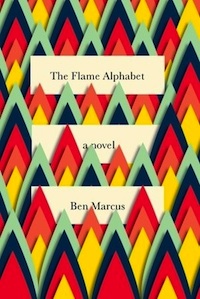On Monday, I had the pleasure of having a live discussion at Brooklyn’s Greenlight Bookstore with Ben Marcus, author of The Age of Wire and String, Notable American Women and recently; The Flame Alphabet. Though not a science fiction guy, Ben’s fiction is nonetheless experimental, and The Flame Alphabet‘s basic premise is possibly his most genre-blurring book yet. Marcus has always been a champion for experimental fiction in the literary mainstream, with his 2005 Harper‘s essay being one of the finest articulations on the subject.
As we were chatting, he mentioned something interesting: he said he plans to have his students try and write stories emulating what fiction will be like 50 years from now. The stories didn’t have to have futuristic elements, but the writing should feel like it was from the future. This got me thinking: what books have attempted this? Which authors have tried to imagine what prose itself will be like in the future?
In order to imagine what prose is like in the future, one probably doesn’t have to be a linguist, thought it wouldn’t hurt. Author and translator Anthony Burgess was famously also a linguist, which likely informed the invented future-langue of A Clockwork Orange. Though Burgess was later unhappy with the public’s reception of this novel, the incorporation of imagined-future slang into the basic fabric of the novel is fairly groundbreaking and unparalleled. Some versions of the book include a glossary of terms while others do not. Which way is the best way to read it? For my money, A Clockwork Orange works best when you don’t have the glossary, meaning you’re fully immersed in the setting of the novel, which allows its satire and imagery to work on a different level.
Something else Marcus asserted during our conversation was the notion that “…we don’t fully understand language. If a person put together the right words in the right order, we don’t actually know what that could do…” Unsurprisingly The Flame Alphabet explores this concept pretty effectively, but when Ben mentioned this notion, I was reminded of the Paul Park story, “Untitled 4” in which a character is imprisoned for a writing a novel so powerful, that just cracking it opne can cause nations to crumble. Park doesn’t always experiment with futuristic prose on the actual page, but he certainly alludes to it in that story and in his novella “Ghosts Doing the Orange Dance” in which a science fiction writer living in the near future is at one point tracing his family’s past by looking through some of the books they’ve written.
Alfred Bester’s lesser-known novel, The Computer Connection, also handily drops the reader into a world with prose which has evolved into something recognizable as English, but is certainly not English. Here, Bester has characters say “Y” instead of “yes” and simply uses the letter “V’ for “very.” But The Computer Connection doesn’t only rely on dialogue tricks; Bester inserts some of this into the narration, owing to the fact that the book is written in first person, meaning the futuristic prose is being directly addressed to the reader. This book doesn’t so much experiment with a future-kind of prose as it does predict some of it.
Jennifer Egan did the same thing a few years ago in the last chapter of A Visit From the Good Squad, in which characters in a near-future New York discuss the meaning of various future acronyms. Gary Shteyngart played with this quite a bit too in the e-mail exchanges in the future New York of Super Sad True Love Story. What makes The Computer Connection interesting is that Bester oddly predicted certain abbreviations which resemble “LOL” and “TTYL.” (As the title suggests, the book also kind of predicts the Internet.) Notably, Alfred Bester’s messing around with a futuristic language takes place in a bona fide science fiction novel, whereas Super Sad True Love Story, and A Visit From the Goon Squad, despite their genre crossover, are for the most part, not science fiction. Does this mean the future of futuristic prose experimentation has shifted over to the literary circles? Maybe.
Further, what is the value of all of this, beyond an interesting thought experiment? Could fiction stories actually move a person not just emotionally, but to some kind of essential revelatory state? Could fiction literally be as dangerous as it is in Paul Park’s “Untitled 4” or in Marcus’s The Flame Alphabet? The latter actually has the main character Sam constructing literal new letters, which are seemingly quasi-organic. This is one of the more interesting ideas about language in the future: at the point at which the medium of writing becomes non-writing, then what the hell are we even talking about?
In an opening scene of Back to the Future 2, a young child mocks Marty’s love of an arcade game by saying “You have to use your hands? It’s like a baby’s toy!” Could prose be like this someday? An outdated arcade game which required some sort of rudimentary interface? And if words are just words, how can we reach to the future with them? Must we invent new words?
And now kind readers, let me know what other novels (science fiction or not!) which have experimented with a future-prose. (The Shakespearian Klingon does not count, because as Gorkon said: it was originally written in Klingon.)
Ryan Britt is the staff writer for Tor.com.










